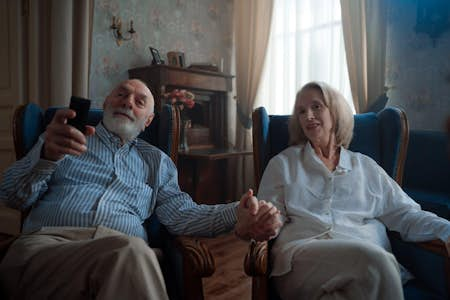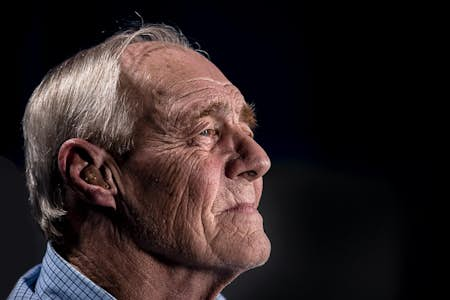Before social media and water-cooler chats, people would gather around the tea trolly, with only three or four channels to choose from. Then, with grumbles about the weather exhausted, talk turned to their previous night's viewing. Millions stayed up to watch Apollo 11 land on the moon in 1968 or gasped in shock as Den waited until Christmas Day to drop the divorce bombshell on Angie. So here, in no particular order, are my top 25 TV shows of the 20th century.
Stay up to date with all your favourite shows - and know what your kids and grandkids are talking about - by taking out a subscription to a leading streaming service. Click a provider below to get started.
Must-see comedies & sitcoms
Cheers (1982 - 93)
It was a close choice whether to go for Cheers or Taxi. Both shows were clever, beautifully written and, as you would hope from a sitcom, funny. Cheers kickstarted the careers of actors who would go on to bigger things. Shelley Long, Ted Danson, Woody Harrelson, Kirstie Alley and Kelsey Grammer are all here. At the same time, Cheers also spawned the top-rated spinoff, Frasier. Except for a few scenes, the action took place in a bar. Still, the show's themes were broader, with episodes that tackled issues such as alcoholism, homosexuality, and adultery, taking Cheers beyond its contemporaries and the usual mainstream sitcom fare. Although critics didn't like the first episode, the series was a resounding success with 275 episodes broadcast and 6 Golden Globe wins.
Friends (1994 - 2004)
Incredibly, it is 18 years since Friends finished. Still, you can be sure that an episode is showing somewhere right now to another generation of fans. Likewise, the theme song, I'll Be There for You by The Rembrandts, is playing on some device - it is streamed 96,000 times a week. As is often the case, critics weren't wild about Friends at first. One referred to it as "the new Seinfeld wannabe" because it was set in a New York apartment and based more on character than plot. However, TV viewers soon grew to love it. The secret was one of the characters felt like they could be your best friend. As a result, Friends became a regular in the top ten TV ratings and won all its cast members, except Courtney Cox, Emmy nominations. If that weren't enough, the series also reportedly helped Liverpool manager Jürgen Klopp learn English.
Monty Python's Flying Circus (1969 -1973)
Monty Python has been a highly influential force in comedy around the world. The adjective "Pythonesque" has entered our everyday language to describe something surreal, absurd, and farcical. Yet despite being all of these things, the humour is intelligent and erudite in the way it references writers, philosophers, history, and literature. Although like much TV comedy, it springs from British University reviews, it is a close relation to the earlier Goon Show and influenced by Spike Milligan's other work, especially Q5. Most of the Python team had worked previously on programmes like TWTWTW, The Frost Report, and the children's show Do Not Adjust Your Set but didn't expect the BBC to give them a free hand making the first series. Then again, they weren't expecting the Spanish Inquisition either.
Fawlty Towers (1975 & 1979 - two series)
I believe that the reason we all find Basil Fawlty so funny is that, while outrageous, we recognise him to some degree in ourselves. He's sarcastic, snobby, misanthropic, put upon, disappointed and frustrated. When he finally acts, he overreacts. Who hasn't wanted to give their broken-down car a damn good thrashing? He embodies repressed emotions that we relate to, and when he blows, we experience the catharsis. The wobbly sets, occasional appearance of an errant boom mic and cheap production values make it look very dated now. But if someone is winding you up, who would not love to come back with..."Well may I ask what you expected to see out of a Torquay hotel bedroom window? Sydney Opera House, perhaps?"
I Love Lucy (1951 -1957)
I Love Lucy was already a massive hit on prime-time TV in the USA when it was first broadcast in the UK as a part of ITV's first week on air in 1955. Such was Lucille Ball's popularity in the US at the time, news of the birth of her first child headlined above President Eisenhower's inauguration. The show used a simple yet effective format that has been followed by sitcoms for years. It was mostly shot on one set, in front of a live audience, using three cameras shooting simultaneously from different angles. I Love Lucy is still held in high regard in the US by both critics and viewers. Repeats continue to be shown on the Hallmark channel, and compilations, colourised versions and box sets are widely available.
Seinfeld (1989 -1998)
Although Seinfeld was initially described as a "show about nothing," it ran to 180 episodes and won numerous Golden Globes, Emmys, and Screen Actors Guild Awards. In 2002 it was also hailed by the US TV Guide as "the greatest show of all time." Maybe that is pitching it a bit high, but it certainly is a good one, with Jerry Seinfeld playing a fictionalised version of himself. The show looks at the relationships between him and three other not so pleasant characters. Set mainly in the same New York City apartment block and focusing on the humdrum events in everyday life, where, indeed, nothing much happens. It is a credit to the writers and the cast that the series became so massive and is still so highly regarded.
Only Fools and Horses (1981 – 2003)
Only Fools and Horses generally ties with Fawlty Towers for the greatest British sitcom ever. In addition, the moment in January 1989 when Del falls through the bar is often considered TV's funniest moment. While on superlatives, the 1996 Christmas special had the largest sitcom viewing figures ever in the UK, with over 24 million people watching. John Sullivan's writing was a thing to be admired, and the show's cultural impact remains today. Del Boy-isms like "you plonker," "cushty," and "lovely jubbly" are part of our language, and the Reliant Regal is forever linked with the show.
The Muppet Show (1976 -1981)
One of the first programmes made for children that gave a knowing wink to their parents and allowed them to join in the fun. Children liked it because the puppets acted like children, and adults enjoyed it because they behaved like adults. Because the format was that of the puppet cast putting on a variety show, it allowed the writers to create a wide variety of new situations with no limitations, but recurring sketches and running gags were possible. Each episode features a different guest star. Following an early episode in which Rudolf Nureyev's appearance on the show created so much good publicity, A-list celebrities lined up to get on.
The Simpsons (1987 -1989 on the Tracy Ullman Show, then 1989 - Present)
One of the reasons The Simpsons has such a broad appeal is that it's so inclusive. To some, Homer can affirm that they are not as much of a couch potato as he and to others, he's a satire in the American way of life. Springfield never changes; the passage of time is marked in birthdays (we know from an episode that Lisa was 8 in 1996) and Christmases. However, the characters don't age, and the tyre dump is still burning. A character may not be able to drive in one episode, but in another, they can. Springfield is a microcosm of dysfunctional modern life.
The Morecambe and Wise Show (1954 – 1983 in various guises)
Eric and Ernie. The most famous and certainly the most loved double-act in the UK. But their TV career didn't start well! In 1954, their first TV show, Running Wild, bombed spectacularly, causing TV critic Kenneth Bailey to write "Definition of the Week: TV set: the box in which they buried Morecambe and Wise." The duo waited seven years before coming back, this time with the hit series Two of a Kind. I don't remember much about it, but I can still sing the theme song! The rest we know - Eric calling Ringo Starr "Bongo" and Vanessa Redgrave "Vanilla Redgrave," or Ernie talking about "that play what I wrote." The Christmas specials are legendary. It was said by scriptwriter Eddie Braben that "people judged the quality of their Christmas experience on the quality of the Morecambe and Wise Christmas Special." For years, they didn't let us down.
The Good Life (1975 - 1978)
The reason I think The Good Life is so loved is the way it encapsulated so many British aspirations. The suburbanite dream of escaping the rat race and getting back to nature (look at the rush to buy a place in the country happening right now), being self-sufficient, and having close friends who you can rely on. Despite her disapproval, you know that Margot (the butt of many jokes and who disapproves of the whole thing) has a heart of gold and will stick up for Tom and Barbara if ever the chips are down. And then, who wouldn't want to get involved in some whacky hijinks involving broken down generators, trying to make your own clothes, or handling an uncooperative goat? In a BBC poll, The Good Life was voted the 9th best British sitcom and what male over a certain age doesn't get a flutter at the mention of Felicity Kendal?
Sorry to leave out
- The Honeymooners
- All in the Family
- Bewitched (the ABC Series)
- The Flintstones
- Happy Days
- The Mary Tyler Moore Show
- The Dick Van Dyke Show
- The Golden Girls
- Porridge
- Sex and the City
- The Brady Bunch
Must-see dramas & TV series
The Sopranos (1999 - 2007)
Whenever the is a TV 'best of' list, The Sopranos usually tops it. HBO had earned the reputation of making hard-edged programmes featuring gritty dialogue and high production values closer to film than what was typically served up on TV. The high quality of the series allowed movie actors to crossover to the small screen without feeling they had taken a step down. The quality of The Sopranos is one of the reasons we see so many A-list actors in miniseries today. In 2013, the Writers Guild of America voted it the best-written TV series of all time. The series and cast have won many awards and allowed networks to make series such as Breaking Bad and The Shield with complex plots and dark characters. Last year a movie prequel to The Sopranos - The Many Saints of Newark - came out staring James Gandolfini's son Michael.
Dallas (1978 – 1991)
Dallas first appeared on CBS in the spring of 1978. With the help of Terry Wogan's sardonic take on the goings-on on the Southfork Ranch, the show soon became a big hit in the UK and Ireland. On 22nd November 1980, Dallas became the 6th most-watched TV programme ever on British TV when it drew an audience of 21.6 million, all desperate to find out who had shot JR in the previous series. The show also caused the biggest moment of consternation ever when it was revealed that Pam Ewing had dreamt everything you had watched and invested in during series 9...What!!? It proved the pulling power of the series that people still came back and watched series 10.
Doctor Who (1963 – 89, 2005 – Present)
We take it for granted that the Boomer Generation's first glimpse of the Daleks or Cybermen was from behind the sofa. And that for a few years, Doctor Who
was about the scariest thing we were likely to see on TV, apart from The Twilight Zone and Fanny Cradock. Unfortunately, as we got older, it all went downhill. Cardboard sets, laughable latex monsters, and Sylvester McCoy (if you were going to regenerate, would you seriously...no, I won't say it). Thankfully, CGI, Russell T Davies, David Tennant (not sure about Christopher Eccleston), and Billie Piper saved it. Now it is so much part of our culture that an episode on Christmas Day is compulsory, and large groups of young men get online and discuss the problems associated with taking apart and reassembling the Tardis.
The Singing Detective (1986)
There have been so many excellent drama series and contributions from extraordinary writers that it is impossible to pick the best. Singing Detective writer Dennis Potter had been a mainstay of TV drama. In The Singing Detective, he mixes a noir detective thriller and flashbacks to rural England as a writer lays in a hospital bed trying to make sense of his traumatic past and present illness. His medication causes hallucinations which manifest as singing and dancing set pieces from the 40s and 50s musicals. Potter used this technique of juxtaposing grim reality with glitzy songs in the earlier series Pennies from Heaven. In 2003 it was adapted into a none-too-successful feature film starring Robert Downey Jr and Mel Gibson.
The Twilight Zone (Original series, 1959 - 1964)
The creepy opening music. Rod Serling, erudite, cigarette in hand, earnestly telling us that we were "about to enter another dimension." A gremlin on the wing of a plane tearing the engine apart as William Shatner's mind unravels. All indications that we're in The Twilight Zone. The show was a mix of parable, science fiction, horror, black comedy, fantasy, and psychological thriller. The episode Nightmare at 20,000 Feet is etched on the minds of a generation. It's always a relief when I fly to look out of the window and see we're alone up there. The stories often covered issues current at the time like war or civil rights and would conclude with a moral that often-illustrated human prejudice or folly. Alfred Hitchcock Presents and Tales of the Unexpected followed but didn't quite have the same panache.
M*A*S*H (1972 - 1983)
A spinoff of a hit Hollywood film, based on a book written by Richard Hooker, the pen name of a former military surgeon and a co-writer, the TV version of M*A*S*H ran for 11 series totalling 428 episodes. The fact that it ran for so long is a testament to the outstanding writing (voted fifth-best ever by the American Screen Writers Guild) and a killer of a theme song. When the series started, American troops were still in Vietnam. Although their involvement would soon end, everyone was sick of the war. The anti-war sentiments expressed through M*A*S*H's tragicomedy caught the zeitgeist. Even though M*A*S*H was set during the Korean War, it serves as an allegory for Vietnam and war in general.
Star Trek (NBC original series 1966 -1969)
The Star Trek franchise has generated an estimated $10.6 billion since it started to boldly split infinitives 55 years ago. Apart from the debate Star Trek has caused among grammarians, tens of thousands of people can happily fix your starship's anti-matter fusion reactor using one of the many technical manuals available. In addition, there are 20 - 30 people on the planet who speak fluent Klingon, and there have been 10 films. On top of this, there have been another three movies in the reboot series and seven additional television series. So for a sci-fi show first catchily named "Wagon Train to the Stars," it's not done too bad.
Twin Peaks (1990 – 1991)
We were all asking, "who shot JR?" in the eighties. In the nineties, the question of the moment was, "who killed Laura Palmer?" You know that things will get a bit peculiar in a series co-created by David Lynch (along with Mark Frost), but subverting a TV series like this was something we hadn't seen before. Not that it was a parody of the genre or small-town USA. From the writing and direction, you can tell that Lynch and Frost have a strong affection for both. As you would expect from David Lynch, the cinematography was idiosyncratic but stunning, and there was the haunting score by Lynch and Angelo Badalamenti. The show returned in 2017 with a third series on Showtime. There is talk of a fourth series, and fans can feel optimistic. Lead actor Kyle MacLachlan said it has been his "favourite role of all time" and that he would "absolutely" return for another season "without even seeing the script."
The Avengers (1961 – 1969)
Not Iron Man et al., but John Steed (Patrick Macnee) with various female sidekicks who were intelligent, tough, stylish, witty and every part Steed's equal, which was unusual at the time. Initially, The Avengers had Ian Hendry in the leading role of David. H. Keel and Patrick Macnee as his assistant John Steed, but Hendry left to pursue a film career, and Macnee took over. During the second series, the character of Dr Cathy Gale, a leather-loving, judo trained anthropologist, joined and established the format. Gale, played by Honor Blackman, was like no other character previously seen on British TV. In part, this came about to save money as the production company decided to use Keel's dialogue for Gale. 1965 saw the arrival of Emma Peel, played by Diana Rigg, and The Avengers became the first British TV show to get a prime-time spot on American television. There were more series when Rigg left, and The New Avengers (with Joanna Lumley, Garath Hunt and Macnee) revived the series in 1976.
Brideshead Revisited (1981)
According to Brideshead's director, Charles Sturridge, 95% of the dialogue is from Evelyn Waugh's novel. Perhaps this is why, in 2015, the Telegraph listed it the greatest ever literary TV adaptation. Brideshead was not big on action, but it was incredibly sumptuous and, although stately, the public loved it. This helped open the door for the Merchant Ivory literary adaptations that followed. When the series went to the States, Brideshead mania ensued. Brideshead fashions became trendy, the word "spiffing" was in, and "neat" was out. Serious young men carried teddy bears called Aloysius. Would people today get so involved with such a slow, character-led plot? We'll have to see. There's a new BBC/HBO production coming out this year with Andrew Garfield set to play Charles Ryder, Joe Alwyn playing Sebastian, Ralph Fiennes as Lord Marchmain, and Cate Blanchett as Lady Marchmain.
Columbo (1971 – 1978, plus occasional episodes 1989 - 2003)
Just when those smug LA types thought they'd got away with it, a rumpled Columbo shuffles back in and says, "Oh, just more thing." It is not a 'whodunnit' but a 'howcatchem' where the Los Angeles rich and famous are often undone by their hubris and always by their underestimation of Columbo. The guest stars, always the perpetrator, queued up to get caught and have been played by actors including Billy Connelly, Faye Dunaway, Vincent Price, Kim Cattrall, and Honor Blackman.
Three pieces of Columbo trivia:
- A 13 episode 'Mrs Columbo' series broadcast in 1979 saw his eponymous wife catching criminals part-time while working as a newspaper reporter.
- There is a statue of Columbo with his dog in Budapest, although no one seems to know why.
- Peter Falk provided his own wardrobe for the role.
Sorry to leave out
- Miami Vice
- Bonanza
- Batman (could've been in either drama or comedy)
- Cathy Come Home
- Pennies from Heaven
- The Jewel in the Crown
- Twin Peaks - The Return
Must-see documentaries
The World at War (1973)
In 1964 there was a 26-part BBC series about the First World War called The Great War. As in real life, the powers that be decided to do it all again, and so The World at War (World War II this time) arrived. Because the BBC had bizarrely gotten into a feud with the Imperial War Museum, the series was taken up by Thames Television, producers of such cultural heavyweights as The Benny Hill Show and Magpie. So, giving it the gravitas required were the sonorous tones of the world champion luvvy, Laurance Olivier, as narrator. What resulted was at the time the most expensive factual programme ever made and a landmark in TV history (it portrayed not just events but gave first-hand accounts of how the war had affected the participants and its victims). The World at War became a benchmark, and subsequent documentary series from makers like Ken Burns - The Civil War and The Vietnam War - would strive to reach the same level.
Life on Earth (1979)
Although I have chosen Life on Earth, anything David Attenborough has done from Zoo Quest in 1956 (even then, he was pleading with an unlistening world to take care of our environment) to whatever he is doing right now has been a joy. Of course, when writing about the best TV shows, "ground-breaking" is an adjective that will come up a lot. Still, Life on Earth was unique in terms of filming techniques and the use of ad-lib to the camera. Channel 4 viewers voted the gorilla encounter number 12 in their Top 100 TV Moments, above the coronation of Elizabeth II and the wedding of Charles and Diana, but below Del Boy falling through the bar. Since 1979 there have been eight 'Life' series, all as sublime and all sadly proving just as prophetic.
Sorry to leave out
- The Civil War
- The Vietnam War
- The Great War
- Civilisation
- Arena
- All Our Yesterdays
- Survival
- The Ascent of Man
- Horizon
- Around the World in Eighty Days
- The Human Body
Must-see chat shows
Parkinson (1971 - 1982 and 1998 - 2004 on the BBC, 2004 – 2007 on ITV)
What emptied the pubs in double-quick time on a Saturday night was not the ringing of last orders but the urgent need to get home in time for Parkinson. Broadcast in an era when chat show guests went on the programme to chat rather than promote a product, the guests wanted to tell some good stories and be seen. Apart from disasters with Anne Bancroft, Meg Ryan, and, for Parkinson at least, Rod Hull and Emu, the anecdotes were compelling. The classy introductory music started, and you would be sitting with sharing a conversation with such celebrity royalty as Peter Ustinov, Muhammed Ali, Oliver Reed, Gregory Peck and David Niven. What was the real secret? Michael knew how to listen.
Sorry to leave out
- The Ed Sullivan Show
- Late Night with Letterman
- The Graham Norton Show
- Wogan
Image Credit: Krzysztof Stefaniak, Shutterstock.com









